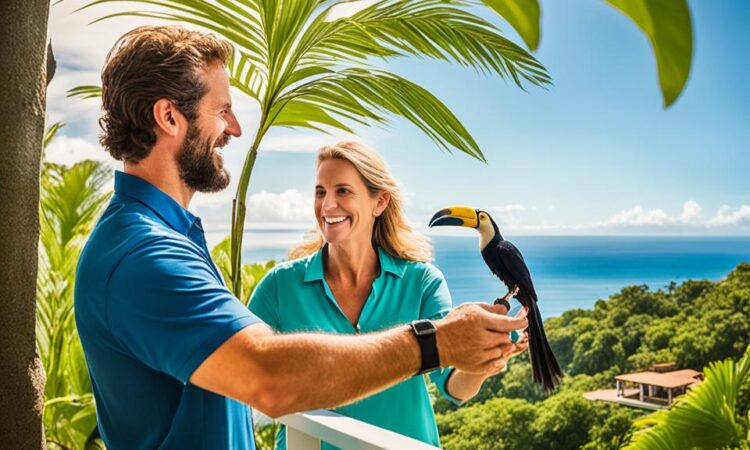
About Expats Down Payments for Properties in Costa Rica
For those dreaming of their own piece of Costa Rican paradise, figuring out how to buy can be tricky. This guide is here to walk you through the twists and turns of real estate financing. We’ll cover everything from getting a mortgage as a foreigner to different ways you can pay for your dream place. This includes what you need to know about down payments, interest rates, and the big picture of investing in Costa Rica.
What are the typical down payment requirements for foreigners buying property in Costa Rica? This question is key to turning your dream into reality.
Key Takeaways
- Down payment requirements for foreigners in Costa Rica can range from 20-50% of the property value.
- Private banks typically offer financing with 30-50% down payments and interest rates of 8.5-10%.
- Private lenders may provide up to 70% financing, with down payments and interest rates varying.
- Seller financing often requires a minimum 50% down payment, with terms of 1-3 years and 6-9% interest rates.
- Understanding the diverse financing options in Costa Rica can help expats make informed decisions about their real estate investments.
Navigating Mortgages as a Foreigner in Costa Rica
Getting a mortgage in Costa Rica is tough for people from other countries. Local banks don’t get info like where you’ve lived, your job history, and money record. The language problem makes things even harder.
Foreign Challenges
It’s really hard for non-locals to get loans for homes in Costa Rica. This is because banks can’t check important things about you. Also, talking about loans in another language is hard work.
Conventional Property Loans
Many outsiders who want homes in Costa Rica go for loans from their own country’s banks. These loans are better because your bank already knows about you. It helps you get a good deal.
| Financing Option | Down Payment | Interest Rates | Loan Term |
|---|---|---|---|
| Conventional Property Loans (Home Country) | Varies | Typically lower than Costa Rica | Varies |
| Private Banks in Costa Rica | 30-50% | 8.5% to 10% | Up to 20 years |
| Private Lenders in Costa Rica | Up to 70% | 8% to 16% | Up to 15 years |
| Seller Financing | Minimum 50% | 6% to 9% | 1 to 3 years |
Financing Options for Expats
Buyers needing money can look into options like borrowing from their own country. They can also use the equity in their home or take money out of their insurance. Doing this lets buyers pay for property in Costa Rica with cash.
Borrowing from Home Country
Taking out traditional loans from banks back home is a good idea. These banks can check if you’re stable financially and have a good work history. This is very helpful for foreigners who find it hard to get loans in Costa Rica.
Private Banks in Costa Rica
Private banks in Costa Rica, such as Banco Lafise, Bac San Jose, and BCT, now give loans for vacation properties to non-locals. The loans can last up to 20 years but need a big down payment. Interest is around 8.5% to 10%. However, this route can be slow and might stress real estate deals due to the banks’ low property valuations.
Private Lenders
Another choice is private lenders. They need to see your property and financial statements. They also want to know how you’re getting your money. You could get a loan for up to 70% of the property’s value. The payback time might reach 15 years, with interest rates between 8% and 16%.
Seller Financing
Some sellers might finance the deal. It’s less strict on what paperwork you need and a property check isn’t necessary. The deals are often set for 1-3 years with 6-9% interest, and a big down payment. There’s room to talk about how and when you pay them back.
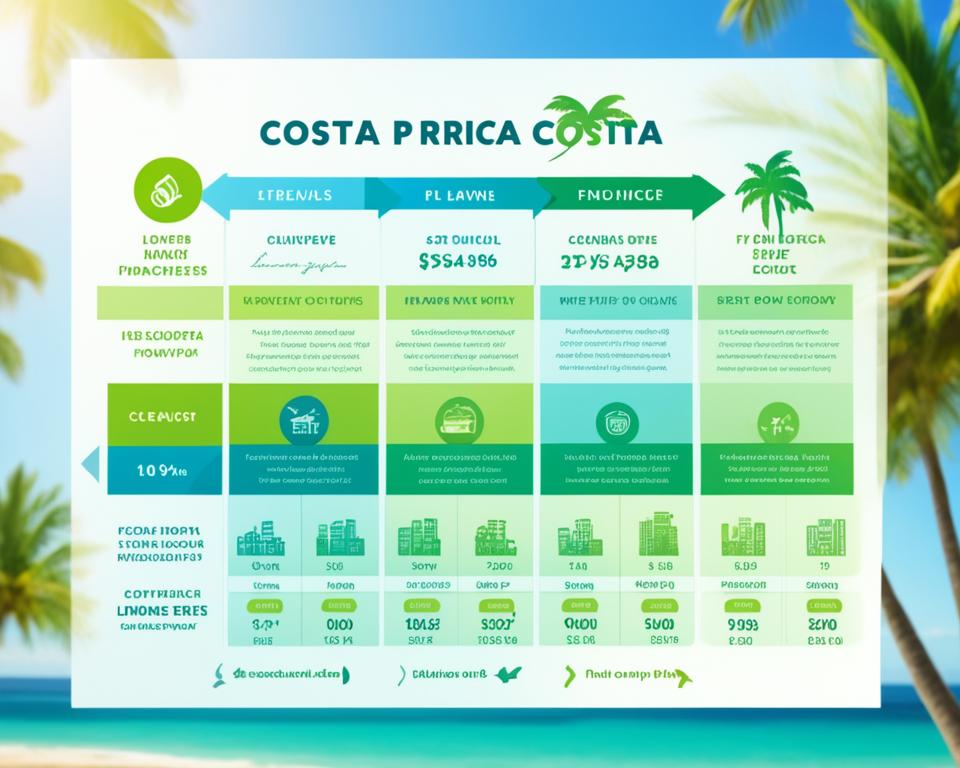
Understanding Mortgage Costs and Closing Considerations
Buying property in Costa Rica means knowing about many costs. People using a loan usually pay these. They can be part of the sale’s end or a separate deal.
Mortgage Costs
In a mortgage, you’ll face some fees. These include a 0.25% registration charge and a 0.53% stamp cost. Notary fees can range from 0.50% to 1.25%.
Closing Considerations
Before buying, check all closing costs with a lawyer. You might have to pay for appraisals, administration, and more. This ensures you know all the expenses.
| Expense | Cost |
|---|---|
| Transfer Tax | 1.5% of the property value |
| Tax Stamps | Varies |
| Legal Fees | Approximately 0.50% to 1.25% of the property value |
| Value-Added Tax (VAT) | 13% on legal fees and Real Estate agent commission |
| Total Costs for a $100,000 Property | Approximately $3,872.00 |
| Total Costs for a $200,000 Property | Approximately $7,369.00 |
Knowing your mortgage costs is important for planning. It helps buyers figure out how much they need. With this info, buying a home in Costa Rica is easier. It also guides expats on down payments and saving tips.
Advantages of Offering Private Home Financing
Costa Rica’s properties are popular worldwide for their untouched beauty. Yet, some buyers can’t access them right away due to low liquidity. This makes private financing a great choice. Sellers can open their market to more potential buyers. This includes those who have limited options for down payment financing or for costa rica investment property down payments. It’s a win-win, allowing the deal to go through and attracting more interested buyers.
Private financing offers can be made to fit the buyer’s needs, offering more flexibility than standard bank loans. This is especially good for investors or those not meeting the usual loan requirements. Yet, they dream of owning property in Costa Rica.
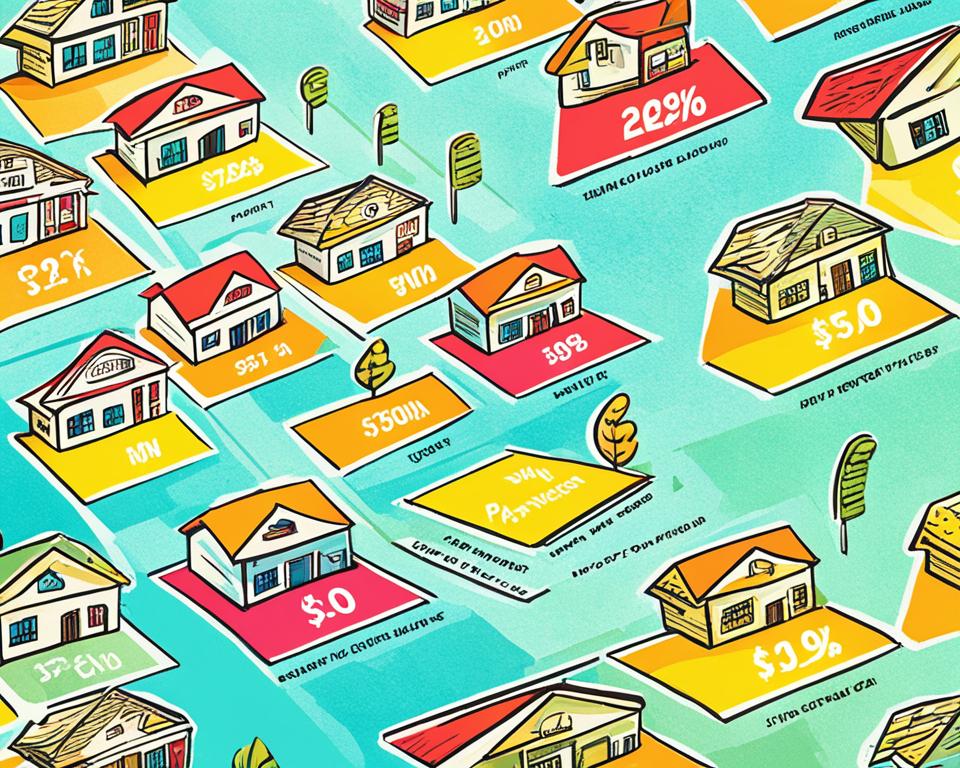
Choosing private financing can help sellers broaden their buyer base. This boosts the chance of long-term success for real estate in the country. It counters the issue of low immediate funds. And, it offers another way for people to achieve their dream of owning a tropical property.
Seller Expectations and Typical Terms
In Costa Rica, sellers who offer private financing have easier rules than banks. They might check your income or credit but don’t always look deeply into your property. By offering to finance, sellers give up cash upfront but ask for the full price to make it worth their while.
Typical Terms of Private Home Financing
Many buyers are looking for short-term financing. This usually means a 1–3 year loan with interest between 5%–8%. They often need at least half of the property’s price as a downpayment. Buyers pay almost the full price in return for this financing. The payment plan can be monthly, quarterly, or yearly, with the full amount due at the end.
Mortgage Costs and Other Financing Options
The person buying with private financing pays the mortgage costs. This includes a 0.25% registration fee and 0.53% for stamps. Sometimes, private financing can come with no interest. Buyers can also look into a line of credit from their home country or work with private loan companies like Loans Costa Rica.
Considerations Before Offering Seller Financing
Sellers must understand the buyer’s position before offering financing. They should know if the buyer can keep up with payments and what the property will be used for. Sometimes, the sale is final even if the property isn’t perfect after checking everything out.
Securing Transactions and Seller’s Decision
Sellers often secure deals with a mortgage. This is more common than using a trust. If a buyer can’t make their payments, the seller can sell the property or get it back. Offering financing helps sell a property, especially to those who can’t pay all at once. Yet, offering financing is not usual and needs careful talking to find what’s best for both parties.
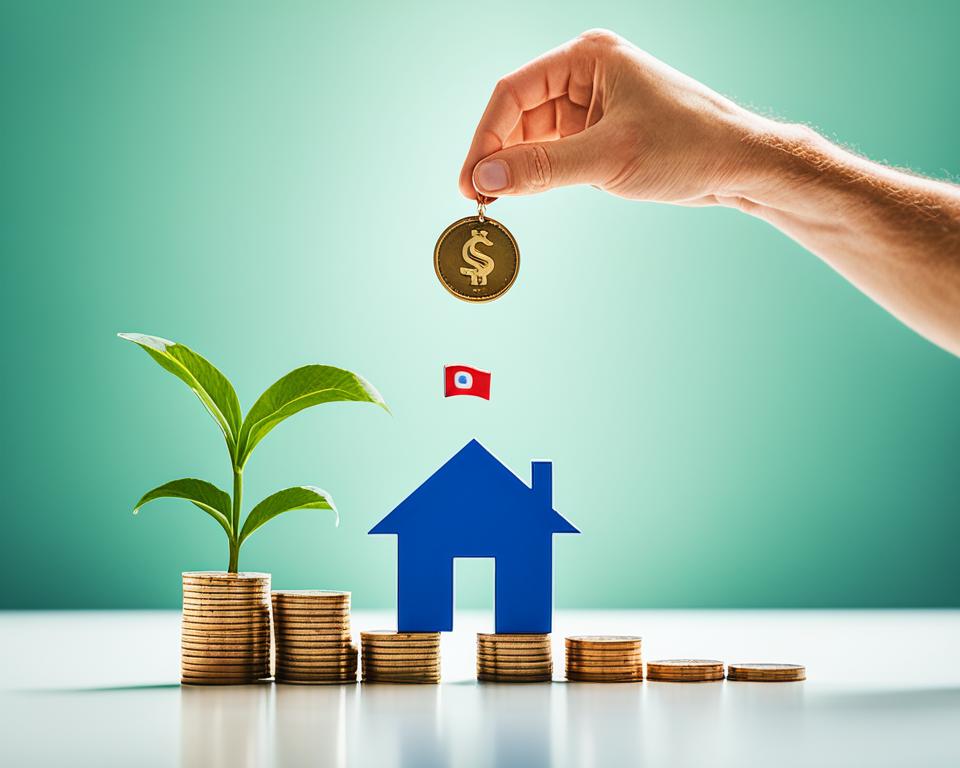
Creative Financing Approaches
Looking for ways to finance a home in Costa Rica? Many buyers get creative. They explore options like financing from the builder or using different types of investments. These approaches can make it easier for expats and global buyers to get their perfect home in Costa Rica.
Builder or Developer Financing
In Costa Rica, some developers have their own financing deals. Buying straight from them might be easier. But, it’s important to check everything carefully. Always work with a trusted real estate agent and a top-notch law firm to make sure your deal is safe.
Creative Short-Term Financing
The hot Costa Rican real estate market pushes buyers to think outside the box for short-term financing. Don’t wait to sell your home country property, or you might lose a great Costa Rican deal. Some use money from a 401k or stocks. Buying a property that can be rented out for vacations is another smart move. It can help cover the monthly bills.
Finance using a Self-Directed IRA
Buying investment property in Costa Rica can be made easy with a Self-Directed IRA. By turning a standard IRA or 401k into a self-directed version, you get more say over your investments. The process is not too complicated. There are firms in the USA ready to guide you through setting up a Self-Directed IRA.
Equity Line of Credit in Home Country
One easy way to finance a home in Costa Rica is by using your North American property’s equity. Many buyers can get a line of credit on their home country property. It’s also possible to get loans from financial firms like Schwab using stocks as collateral. These loans generally have low interest rates, offering another funding choice.
Long-Term Planning with Vacant Lots
Thinking of spending time in Costa Rica in the coming 3 to 5 years? A good strategy is buying a vacant lot. It’s cheaper to own and carries low costs. Later, you can build on the lot. This way, you plan for the long term and grab a short-term investment at the same time.
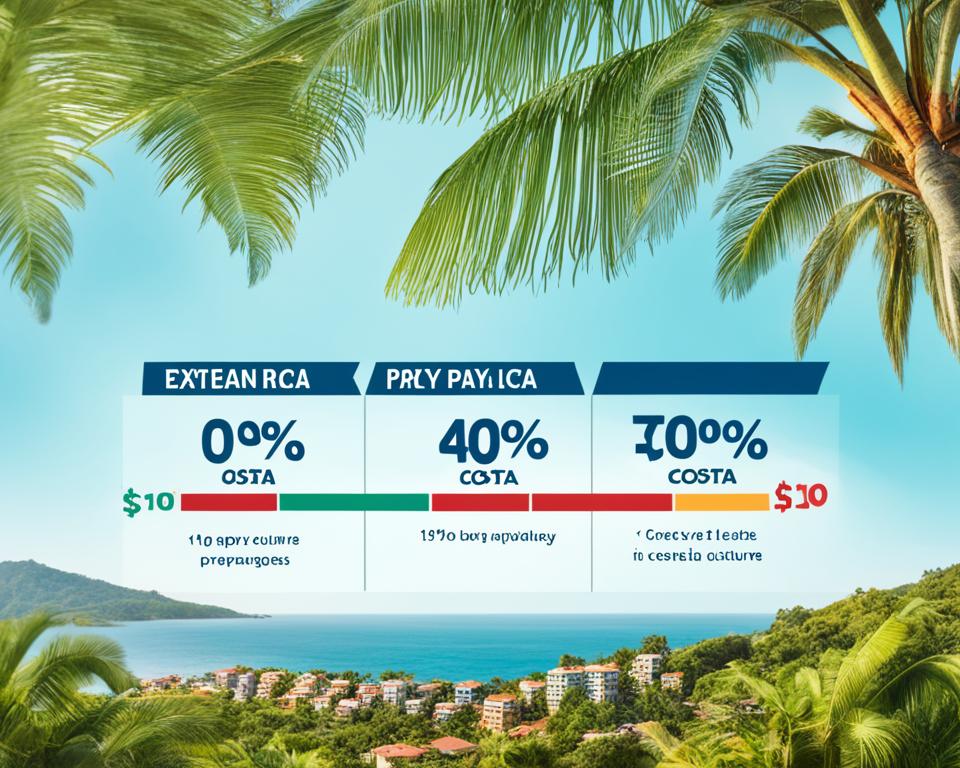
about Down Payments in Costa Rica
In Costa Rica, real estate financing needs a down payment. The amount changes based on your financing choice. We will look at common financing types and their down payment needs.
Private Banks
Costa Rica’s private banks, like Banco Lafise and others, usually want 30-50% down. They offer loans up to 20 years with interest at 8.5% to 10%.
Private Lenders
Private lenders might need as much as 70% down. The down payment and rates (8% to 16%) can differ depending on the lender.
Seller Financing
Seller financing allows for more flexibility. It often requires a 50% down payment. The loan can last 1 to 3 years with interest at 6% to 9%.
| Financing Option | Down Payment Requirement | Interest Rates | Loan Terms |
|---|---|---|---|
| Private Banks | 30-50% | 8.5% to 10% | Up to 20 years |
| Private Lenders | Up to 70% | 8% to 16% | Varies |
| Seller Financing | At least 50% | 6% to 9% | 1 to 3 years |
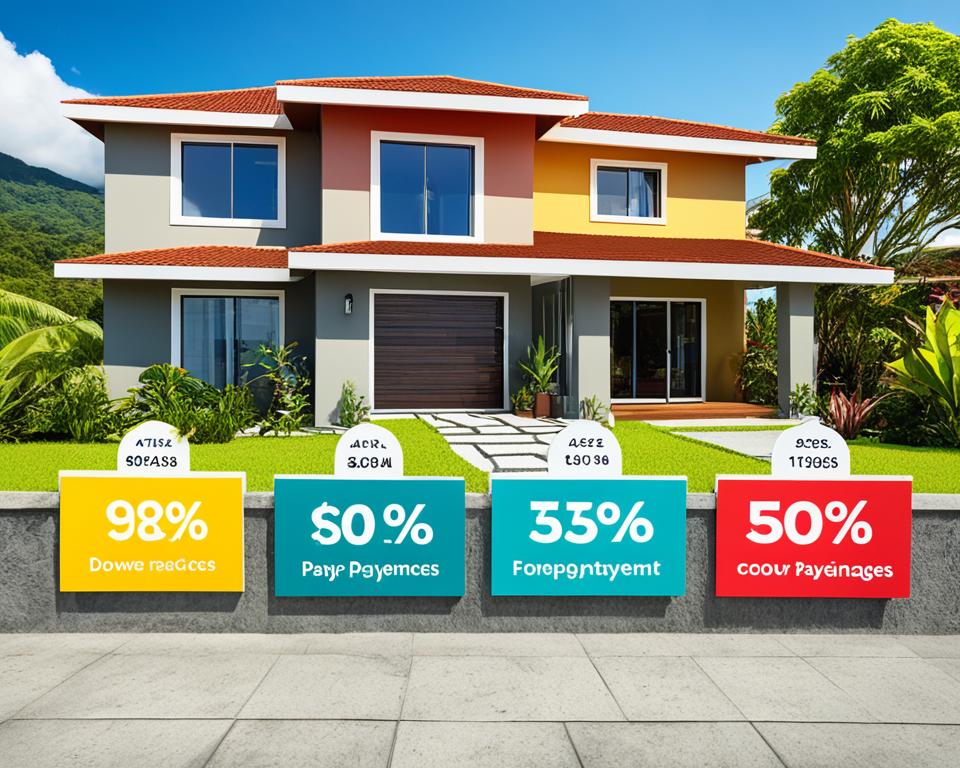
Interest Rates for Mortgages in Costa Rica
Gaining clarity on interest rates is key when financing in Costa Rica. These rates vary widely if you’re a foreigner getting a mortgage or looking at private loans. It all depends on the lender and the loan details.
Private Banks
Entities like Banco Lafise, Bac San Jose, and BCT offer financing for second homes. Their interest rates usually fall between 8.5% and 10%. This makes them a good choice for buying property with a loan costa rica real estate financing down payments.
Private Lenders
Costa Rica also has private lenders offering various rates, from 8% to 16%. These loans’ conditions and rates reflect the borrower’s financial situation. They typically ask for a larger down payment, around 70%, to lower the risk.
Seller Financing
Buying property in Costa Rica through seller financing involves the seller giving the loan. This method might have more flexible terms compared to bank loans. Interest rates can be favorable, between 6% and 9%, for buyers looking at costa rica house down payment percentages.
For prospective buyers, knowing about interest rates is crucial. It helps in making smart choices and finding the right financing fit. With the guidance of skilled professionals, navigating through various finance options can lead to owning a dream costa rica home purchase down payment.
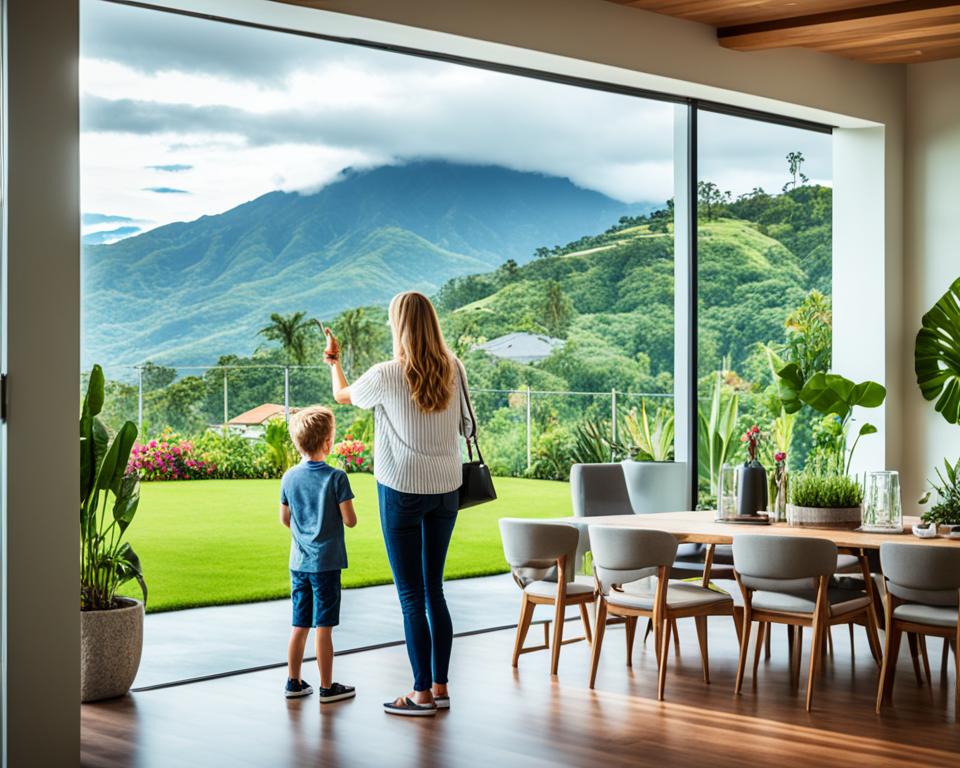
Conclusion
Costa Rica’s real estate offers many financing options. Each has its benefits and things to think about. Figuring out how to get a mortgage as a foreigner or looking into private financing are just a couple of choices.
Knowing the details of these options is important. It’s best to work with experts. They can help turn your property dreams into reality in this tropical place.
Understanding down payments is key when buying property in Costa Rica. Whether it’s learning about financing or using a down payment calculator for property, research is vital. Partnering with local experts is smart.
There are many ways to finance your purchase. From mortgage options to assistance programs, buyers can move forward confidently. They won’t be held back by confusing rules.
The expat guide to down payments in Costa Rica is very useful. It shows the importance of knowing the market. And how to fit your finances with local real estate payment standards. This way, you make the best property investments in Costa Rica for your future.
FAQ
How do I calculate the required down payment for a property in Costa Rica?
Can I use cash as a down payment for a property in Costa Rica?
What are the disadvantages of a large down payment in Costa Rica?
What are the benefits of a down payment for a property in Costa Rica?
Can I get a mortgage for a house in Costa Rica?
How do I start a down payment for a property in Costa Rica?
What are the typical down payment percentages for property purchases in Costa Rica?
What are the Costa Rica real estate down payment requirements?
How much cash do I need for a down payment on a property in Costa Rica?
Is 3% enough for a down payment on a property in Costa Rica?
Source Links
- https://osatropicalproperties.com/blog/real-estate-financing-in-costa-rica-can-you-get-a-mortgage-for-a-home-in-costa-rica
- https://flamingobeachrealty.com/can-a-foreigner-finance-real-estate-in-costa-rica/
- https://cbpacificrealty.com/article/foreigner-mortgage-guide-your-fast-track-to-costa-rican-property-ownership
- https://www.nikorilifestyles.com/blog/navigating-the-complexities-of-real-estate-ownership-in-costa-rica
- https://www.remax-oceansurf-cr.com/financing-for-foreigners-in-costa-rica
- https://ticotimes.net/2022/03/15/costa-rica-real-estate-closing-process-and-costs
- https://gapinvestments.com/en/how-does-investment-property-financing-work-in-costa-rica/
- https://www.gapequityloans.com/en/buy-a-home-with-owner-financing-in-costa-rica/
- https://www.gapequityloans.com/en/costa-rica-home-equity-loans-guide/
- https://gapinvestments.com/en/costa-rica-investments/
- https://www.gapequityloans.com/en/buy-home-with-financing-costa-rica/
- https://crie.cr/buying-property-in-costa-rica/
- https://gapinvestments.com/en/inner-circle/
- https://gapinvestments.com/en/faq/
- https://livingcostarica.com/costa-rica-real-estate-topics/financing-property-in-costa-rica/
- https://gap.cr/how-to-purchase-a-home-in-costa-rica-without-having-all-the-money/
- https://www.welovecostarica.com/down-payments-to-tie-down-your-home-in-costa-rica/
- https://gapinvestments.com/en/secure-loans-in-costa-rica/
- https://www.specialplacesofcostarica.com/blog/how-to-get-a-mortgage-in-costa-rica/
- https://crie.cr/financing-a-property-in-costa-rica/
- https://flamingobeachrealty.com/how-to-get-a-loan-to-buy-real-estate-in-costa-rica/
Article by Glenn Tellier (Founder of CRIE and Grupo Gap)
